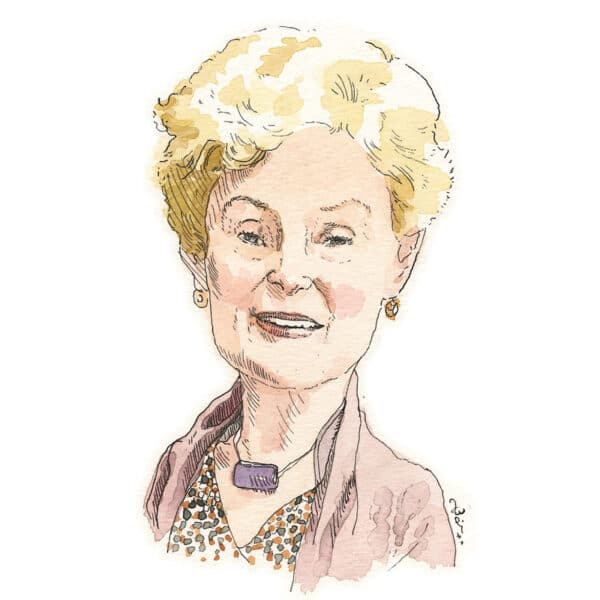FROM HARROWING TO HEARTENING
By Bill McLean
ILLUSTRATION BY BARRY BLITT
Estelle Glaser Laughlin
By Bill McLean
ILLUSTRATION BY BARRY BLITT
Estelle Glaser Laughlin

Nearly three years ago, while researching for her novel The Goddess of Warsaw, author and Deerfield resident Lisa Barr visited the home of Holocaust survivor Estelle Glaser Laughlin.
“She lived 10 minutes away from me,” says Barr, whose grandmother survived the Holocaust. “As she opened her front door and we looked at each other, we had this moment, a moment we thought we had known each other for years. I walked in and then we held hands for the entire interview.
“I couldn’t even take out my tape recorder.” G
laser Laughlin touched something else that day—Barr’s heart.
Born in Warsaw, Poland on July 9, 1929, Estelle Glaser Laughlin, nee Wakszlak, had recounted for Barr some of her harrowing experiences during the Warsaw Ghetto Uprising in 1943 and at the Lublin-Majdanek concentration and extermination camp.
Estelle’s older sister, Freda, was badly beaten and could not work after she, Estelle and their mother were selected for forced labor. Suspecting Freda was on the list to be murdered in the gas chamber, Estelle and her mother switched places with two other women on the list so that the family could stay together. But the women on the list were sent to the Skarzysko concentration camp to work in a munitions factory instead, and later to another factory at the Czestochowa concentration camp.
“On the day we first met, Estelle was magic, honest to God, and so filled with love and brilliance,” Barr recalls. “What stayed with me was learning what the sisters’ father (who did not survive the war) did nearly every day at the Warsaw Ghetto. There they were, surrounded by people dying or suffering from disease, and mostly everyone was starving. Just about every day against that backdrop, Estelle’s father taught French lessons.
“I asked Estelle, ‘Why French lessons?’ She told me her father wanted her to visualize Paris and its beauty and to imagine buying a beautiful dress there someday. Thoughts of the future gave Estelle hope during those dark times.”
Estelle and her mother and sister were liberated by Soviet forces in January 1945 and moved to Allied-occupied Germany in August. In 1947, when Estelle was 18, the family moved to New York City. With only three years of public education, Glaser Laughlin— who would earn a master’s degree in Education—served as a longtime public school teacher in Maryland and moved to the Chicago area in 2013 to be closer to her grandchildren.
“Estelle added the most invaluable touch to my work,” Barr says of The Goddess of Warsaw, which was published in May. “We developed a friendship. I’ll always feel fortunate that Estelle’s beautiful soul graced my life.”
Estelle Glaser Laughlin died at age 95 on August 27. She wrote her memoir, Transcending Darkness: A Girl’s Journey Out of the Holocaust (2012) and the novel Hanna, I Forgot to Tell You (2020). For more than 10 years, her voice moved audiences assembled by the speakers’ bureau of the Illinois Holocaust Museum & Education Center in Skokie.
“Estelle’s ability to articulate the darkest of times showed her strength and resiliency and helped answer ethical and existential questions,” says Kelley Szany, senior vice president, Education & Exhibitions, at the Museum. “It was like sitting with a rabbi or a priest when I was with her. After having seen the darkness of humanity, Estelle still had an incredible belief in the best of humanity.”
In an interview with WTTW News in 2013, Glaser Laughlin shared what motivated her to write her memoir more than six decades after her liberation from the Nazis.
“The question: How did I survive?” she began. “How did my mother and sister survive? How did we survive whole? With compassion, with joy for life, with reverence for life? I think that I’m very fortunate to be an optimist.”
Szany, for one, considers it a gift to have known Glaser Laughlin, the speaker, and Glaser Laughlin, the woman who could walk into a room full of people and transfix them immediately.
“Estelle did that with her quiet strength and absolute grace, as well as with the way she carried herself,” Szany says. “Talking with her for only 10 minutes fueled and fed your heart and spirit; she was that engaging, that inspiring. And Estelle had the greatest smile and the greatest laugh. When you were near her, you felt you were in the presence of a gorgeous movie star.
“Estelle,” she adds, “took your breath away.”
So did her writing.
“She wrote like a poet,” Szany says. “Such a beautiful writer. I read her memoir in two days. I couldn’t put it down.”
Memories of Poland before the Nazis invaded the country, in addition to all those French lessons that doubled as escapes, lifted Glaser Laughlin and cushioned, albeit briefly, the wickedness around her for the first half of the 1940s.
“It glows in my selective memory—gold and radiant, lilac trees against open blues skies, with sounds of good neighbors, kindness, faith, and love,” she told WTTW News. “All of these things became shelters for me later in a world that crumbled around me.
“When you lose everything,” Glaser Laughlin continued, “your memories become your possessions.”
Glaser Laughlin’s life after arriving in the United States will always marvel Barr.
“Estelle’s way of winning in life was through survival, love, and educating others,” she says. “Think about all those children she taught. They must have felt blessed to have been educated by such an extraordinary woman.”
Glaser Laughlin was preceded in death by her husband, Charles Laughlin, and is survived by three children, seven grandchildren, and five great-grandchildren.
Services were held at Shalom Memorial Park in Arlington Heights on August 30.
Sign Up for the JWC Media Email